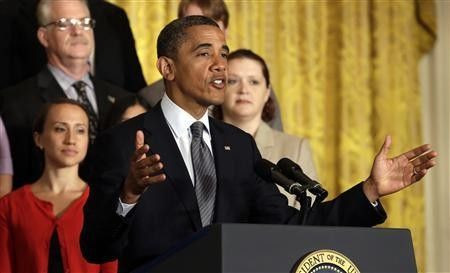Most Americans Believe Wealth Is Impossible Dream: Poll

The idea of the American dream may be ingrained as a hallmark of life in the United States, but an increasing number of Americans believe that dream is impossible for them to achieve, according to a new poll.
Nearly half of likely voters -- 47 percent -- do not believe it is possible for them to become wealthy over the course of their lifetime, according to a survey conducted for The Hill, a finding that suggests a good portion of Americans are pessimistic about the possibility of upward mobility. That feeling may be particularly strong during an election cycle where the economic divide between the rich and poor has been consistently highlighted through a string of debates regarding the nation's tax code, social welfare system and the vetting of ultra-wealthy Republican presidential nominee Mitt Romney.
The national debate on wealth intensified in recent weeks after President Barack Obama urged Congress to extend the George W. Bush-era tax cuts for middle-class Americans, but not for families earning $250,000 or more per year -- about two percent of the population. Congressional Republicans, who have claimed allowing those tax cuts for the affluent to expire on Jan. 1 is akin to class warfare, are expected to back similar legislation that would extend those cuts for all Americans.
The general public's stance on those tax extensions is narrowly divided, according to the poll. Forty-seven percent of respondents said those cuts should only be expanded for families earning less than $250,000, while 41 percent agreed they should be extended across the board.
The median household income in the U.S. was $51,914 between 2006 and 2010, according to the U.S. Census Bureau. Internal Revenue Service Statistics from the 2009 tax year said it took an annual income of $343,927 to be in the top 1 percent of tax filers that year and $112,124 to be in the top 10 percent.
Even As Obama Plan Leads, Voters Trust GOP More On Taxes
Interestingly, while slightly more respondents agreed with Obama's proposed plan, more of those same voters said they trusted Republicans (43 percent) more than Democrats (36 percent) when it comes to tax policy. When analyzed by income, that still stuck: among people earning $40,000 to $60,000 per year, 48 percent said they trusted Romney compared to 39 percent for Obama. In the next income level -- $60,000 to $75,000 -- more respondents also said Romney was more trustworthy.
In fact, Obama polled better only among voters earning more than $100,000, with 51 percent saying they trusted him, and 44 percent saying they preferred him over Romney when it comes to taxes.
But while polling suggests Americans favor Obama's tax plan, it also indicates the president needs to work harder to differentiate himself from Romney. According to a survey released by the Pew Research Center on Tuesday, about 20 percent of likely voters are unsure of which candidate wants to raise taxes on incomes over $250,000, while another 14 percent believe it's actually Romney's proposal. A full quarter said they had not heard anything about reforming the tax code.
But there's some good news for Obama. The president's tax plan appears to be considerably more popular among the coveted independent voters according to Pew, which reports 41 percent of self-identified political independents said Obama's proposal would help the economy, compared to 18 percent who said it would hurt it.
© Copyright IBTimes 2024. All rights reserved.




















